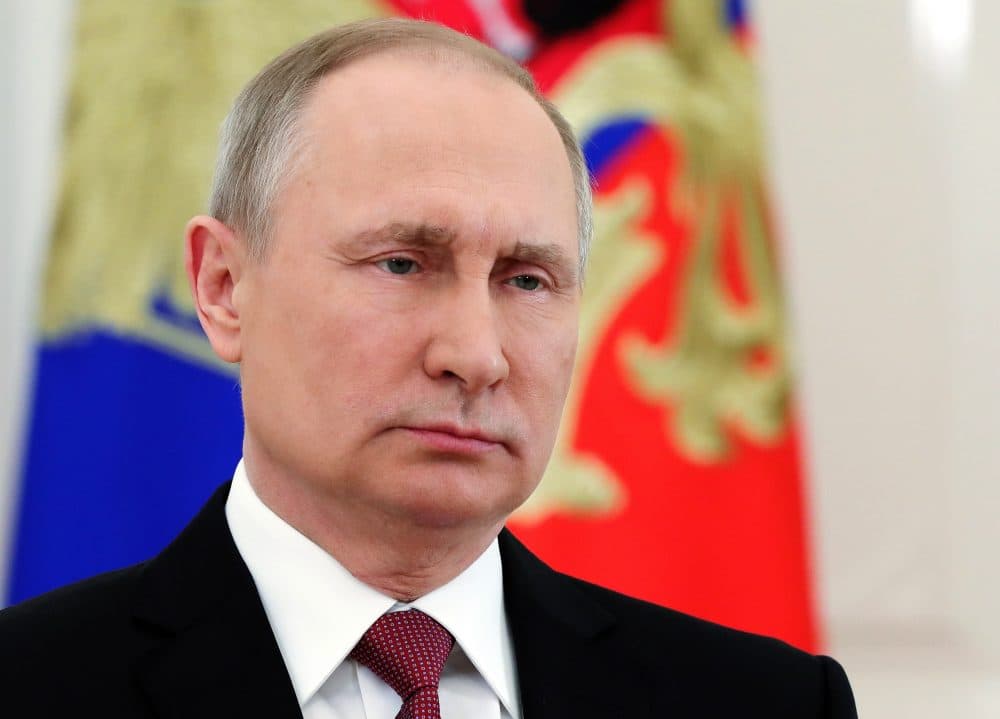Advertisement
Commentary
The West Must Punish Putin — But How?

To paraphrase those great foreign affairs analysts, Rodgers and Hammerstein, how do you solve a problem like Vlad Putin?
Overwhelmingly re-elected to another six-year term this month, Putin basked as the Kremlin credited his victory to a voter backlash against recent Western pressure on Russia. (Apparently, being the only real candidate running wasn't enough to put him over the top.) But of course the West must punish Putin:
For the nerve agent attack on a former Russian spy and his daughter in Britain, in which Russia denied involvement but in which we, Britain and others see the Kremlin’s hand. For Russian cyber-targeting of U.S. and European power plants and utilities. And for election meddling, both in 2016 and, our intel predicts, in this year’s midterms.
These violate not just law but the norms of civilization. Even Donald Trump, who couldn’t resist phoning congrats to Putin after his re-election (offending even Mitch McConnell!) imposed sanctions on 19 Russians and five Russian organizations for mugging the 2016 election. Most of them already had been indicted by the special prosecutor probing Russia’s election interference.
The indictment complicated summer vacation plans for the targeted oligarchs. Anyone wanted in a U.S. court of law “can’t just show up to London, he can’t go to the Italian Riviera,” said Michael McFaul, President Obama’s ambassador to Russia. But Trump added only a few individuals to that list.
Separately, the U.S. froze American assets of Russian security services and military intelligence for the infrastructure cyber-attacks, but McFaul said those assets may be hard to trace. The freeze won’t chill Putin enough to alter his behavior, he predicted.
Experts have suggested actions that might put the Russian bear in a tighter vise, some of them noted by WBUR news analyst Jack Beatty and all worth considering:
Lean on Saudi Arabia, our ally, to pump more oil. Russia’s economy lives or dies by its oil exports, the falling prices for which have already slashed the state-owned energy company’s capitalization to just one-seventh of what it was a decade ago.
Four years ago, an unconfirmed theory had it that the U.S. and Saudi Arabia agreed to keep oil production elevated to depress prices and hurt Russia. We were angry at Russia’s intervening in Ukraine and annexing Crimea, while the Saudis were upset at Putin’s support for the Syrian regime, a Saudi rival. Getting the Kingdom’s help now to further crater Russia’s economy, while a temporary setback to combating climate change, might be in order.
Advertisement
Declare Russia a state sponsor of terrorism. A fitting response to the attempted murders in England. (We don’t know as yet whether the Kremlin was involved in the recent killing in England of a Russian businessman tied to a prominent Putin critic.)
Nations on the state-sponsor list lose U.S. aid, weapons sales, exports and financial deals.
Turn off Russia’s global ATM. Depriving Russia of the SWIFT service, by which banks make international cash transfers with each other, has been discussed since Putin’s Ukraine shenanigans. Russia claims it could live with that penalty but admits it would be “unpleasant.” It would also require the agreement of the European Union; the attack on British soil and U.S. lobbying might secure it.
Spread the existing sanctions net farther. In contrast with the paltry number of Russians Trump sanctioned, there are 210 Putin pals on a U.S.-compiled list.
Extending sanctions to more of them — plus stopping laundered Russian investments in American and European cities and mounting tit-for-tat cyber-assaults — would replace our goldfish’s bite on Putin’s posterior with a shark’s, says Daniel Fried, a diplomat under the Clinton, Bush and Obama administrations. Some suggest sanctioning a few Russians who aren’t on the list, “just to keep them guessing.”
Fried suggests a more martial sanction that needs to be carefully considered, given the risks: arming insurgents in Syria and continuing to arm those in Ukraine who are battling Russian forces.
The Golden Rule. Finally, countering Putin must include demonstrating the moral difference between us and him in the court of world opinion. Brown University’s Stephen Kinzer says Trump actually has a good idea here, having proposed a crippling budget cut to the National Endowment for Democracy. This Reagan-era relic funnels money to foreign unions, political and civic groups, and others to pump up pro-American regimes, involving us hypocritically in the shenanigans we condemn.
Former Vice President Joe Biden says Putin erroneously thinks the U.S. wants to topple him; maybe he gets that idea from the Endowment’s existence. “Promoting democracy is a wonderful idea,” Kinzer writes. “We should begin at home. If we want other countries not to meddle in our politics, we should refrain from meddling in theirs.”
